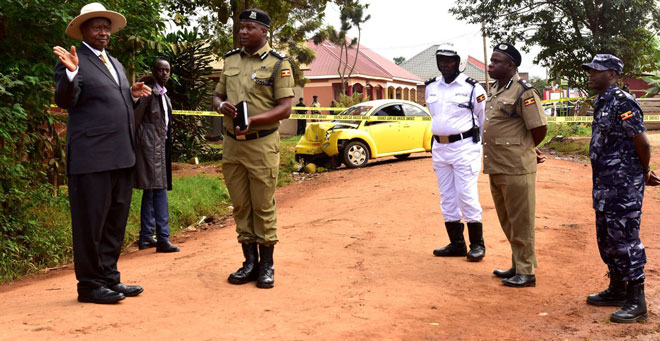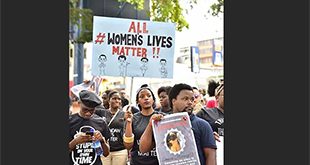
THE LAST WORD: How to renew our nation’s security architecture to cope with the new challenges of murder and kidnapping
THE LAST WORD | Andrew M. Mwenda | The cold bloodied murder of Arua Municipality Member of Parliament, Ibrahim Abiriga, has reignited the debate on security in Uganda. Throughout last year, it was alleged that the security situation in the country had deteriorated because then Inspector General of Police, Kale Kayihura, had privileged clamping down on opposition activism over criminal policing. He was also accused of working with criminals. His removal, it was argued and later celebrated, would end kidnappings and murders.
It is three months now since Kayihura left office. However, the security situation is getting worse. Some may say it is still too early to judge. However, our politicians, elements in security (who were fighting Kayihura), journalists, civil society activists, pundits and social media noisemakers have largely been mute. Of course most of these people do not really care about security. For many of them these security problems offer an opportunity to score political points and thereby win the affection of the hordes.
Uganda has a problem of crime in large part because the country is undergoing rapid structural change. Our urban areas, especially Kampala, are growing rapidly. Many who were born in this city or have migrated into it are doing well. But when they compare themselves with the affluent, they feel left behind. This creates social frustration and they turn to crime to make quick gains. Cities create anonymity, which facilitates crime. However, urban poverty/crime is a sign’s of a city’s growth and vitality.
The recent outrage at murders and kidnapping is, ironically, evidence that the state in Uganda has greatly improved citizen security. There was a time (1971-1986) when crime was orchestrated by state security agencies. They would kidnap and kill people in broad daylight. Between 1986 and 2005, insecurity was orchestrated by non-state actors: myriads of our citizens were being routinely killed by rebels and cattle wrestlers. Millions lived in internally displaced camps in Northern Uganda, especially Acholi region, and in Bundibugyo and Kaseese in Western Uganda.
Joseph Kony’s Lord’s Resistance Army was abducting children daily. I remember kids in Gulu would, every evening, walk from their homes to sleep on the streets of that town because the countryside was not safe. I also remember motor vehicles travelling to Northern Uganda could only do it twice a week in a heavily defended convoy – in both cases because the state had lost control of territory.
For many years, cattle wrestling by Karimojong had destroyed normal life in Teso and parts of Lango. The Allied Democratic Forces would set bombs in restaurants around Kampala killing tens of people. In Kabarole, Bundibugyo and Kasese districts, ADF would raid villages and kill tens of people. In 1998 it burned to death 80 students in their dormitories and abducted 100 others at Kichwamba Technical College.
Gone is this kind of highly organised and large scale threat to national security that characterised Uganda from 1971 to 2005. The recent insecurity consists of isolated criminal gangs that are killing and kidnapping people on a very small scale. That Ugandans are outraged at these developments only shows how far the country has come. Compared to the past, these are mere pin pricks.
Of course this is not to diminish the pain of those who have lost loved ones. Rather it is to emphasise the fact that the current outcry is a sign that the state has achieved effective monopoly on the exercise of violence. Ugandans have gotten used to a very secure political order. So any disturbance of their peace is intolerable. The recent outrage shows how far the goal posts of security have shifted.
However, the situation in Kampala and the surrounding areas is not as bad as is presented by the high priests of our politics. I walk alone at night around this city and it is always busy with patrons drinking at their favourite clubs, people in Kikubo doing brisk business, streets filled with traffic. Criminals are only able to operate in dark and isolated neighborhoods. Yet our elites want to pontificate as if these recent crimes are a sign of the end of the world.
The claim that the country’s security has fallen apart, a claim that President Yoweri Museveni reinforces with his reckless speeches, is actually a gross exaggeration of the problem. Museveni may have his own reasons for undermining the credibility of his government with his reckless speeches that reinforce the opposition message. But his claims are often only a small part of the truths.
The recent spate of kidnappings and killings shows three major lapses of the Museveni administration: one is the collapse of the Local Council (LC) system as a civic institution for ensuring community security; the other is the increasing erosion of the prestige and authority of the police (I see Ugandans beating police officers on duty – and recently the new IGP advised people to do more of this); the third is the erosion of the relationship between security services and citizens in providing security.
Museveni has talked of the need to equip police with technical capacity to monitor crime like putting cameras on streets; installing equipment on all cars to monitor their movements, improving the forensic capabilities of the police etc. These ideas are good but expensive to implement and maintain. Besides, the dust in Kampala will most likely block the cameras. The lack of street lighting means the cameras will not see the killers in the dark. Also, there is the likely risk that these cameras will be stolen or vandalised as happens to streetlights. Therefore, the president is suggesting an investment that is likely to be both expensive and ineffective.
Sadly Museveni expressed reservations about taking a tough stance on crime with high handed crackdown on criminals. This is being naïve. Combating crime requires a firm hand, one that is not constrained by many checks and balances. Criminals need to get a sense of the evil that gets visited on those who threaten security. This demands an extremely harsh and even arbitrary response where – I must add – many innocent people will get hurt.
The first step is reestablishing security is popular vigilance i.e. people taking care of security in their communities working in concert with police and other security agencies. For this to work we need to reinvigorate the LC system by renewing its mandate and giving it a sense of purpose and agency. This will be critical in both stopping and/or investigating murders and kidnappings and deliver better results at low cost than Museveni’s proposed cameras.
****
amwenda@independent.co.ug
 The Independent Uganda: You get the Truth we Pay the Price
The Independent Uganda: You get the Truth we Pay the Price


